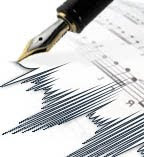Today music is no longer just the domain of the romantic, it isn't enough to have a "good ear." Music is a good program for creative students and in the highly complex world of digital music, advanced training at a college is a must. Musicians and sound engineers need training on the complicated equipment for their craft.
There are both traditional campus and online options for studying music and both STUVU Ranked Schools and eHow rankings highlight Berklee College of Music as one of the best music production schools in the country. It is one of the oldest. Located in Massachusetts, this college's stock in trade is that it is very popular among jazz musicians. It's been popular since the 1940s when it was founded.
 Music production college is distinctly different from conservatories or traditional colleges of music. These schools focus on the recording or capture of music. Their courses of study emphasize the mechanics of sound fidelity and recording. Traditional colleges of music focus on performance. Among these schools are: McNally Smith College of Music, the University of Texas at Austin, Berklee College of Music, The Clive Davis Department of Recorded Music at New York University's Tisch School of Arts and Indiana University at Bloomington.
Music production college is distinctly different from conservatories or traditional colleges of music. These schools focus on the recording or capture of music. Their courses of study emphasize the mechanics of sound fidelity and recording. Traditional colleges of music focus on performance. Among these schools are: McNally Smith College of Music, the University of Texas at Austin, Berklee College of Music, The Clive Davis Department of Recorded Music at New York University's Tisch School of Arts and Indiana University at Bloomington.There are many methods for locating a music production school. Ehow ranks the schools by their curriculum and student scoring. Stuvu ranks music production schools by student's comments. Hackcollege uses the size of the student enrollment as a quick sort for quality of program.
Because the schools tend to lean towards specific genres or aspects of music production, the best way to determine which school works best is determine what the students wants out of the school. Is it an improvement of existing skills so that a certificate is sufficient? Is it a career in music coming out of school? That will probably require a fully-accredited degree approved by an institution like CHEA.org or something comparable. Make sure that the school is accredited.
The next step is to figure out the type of music that the student is most interested in, because the faculties tend to be somewhat oriented along musical types. Is it rock-n-roll? Jazz? Classical? Then identify the school that has the best faculty for that endeavor. University of Texas, for example, is close to a lot of country music, rockabilly and country-rock crossover music labels. Berklee has many jazz musicians on its faculty. McNally and some schools in Los Angeles, CA have a more rock connections. Find the school whose faculty's musical interests mostly closely reflect the genre of the student's interest. Using this methodology, students will find that they are music production being trained by people whose interests they share.






I surprised with the analysis you made to make this particular publish incredible. Wond erful activity! best audio production schools
ReplyDelete